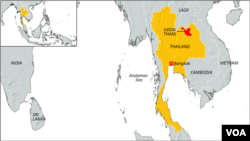A well-known pro-government leader has been shot and wounded in northern Thailand, as Bangkok comes under a state of emergency to deal with simmering political violence.
Police said Kwanchai Praipana, a leader of the pro-government "Red Shirts", was shot twice by unknown attackers during a drive-by shooting Wednesday at his home in the northeast province of Udon Thani.
The incident follows several attacks on anti-government protesters, who on Wednesday began their ninth consecutive day of demonstrations in the capital.
The violence has prompted the declaration of a 60-day state of emergency in Bangkok and surrounding areas, although there is no sign security forces will clear the protests.
Although police stepped up inspections at checkpoints near the camps, there was not a heavy military presence. Authorities have also not imposed a curfew or banned political gatherings, as allowed under the emergency decree.
Army chief Prayuth Chan-ocha said Wednesday his troops will "not lead the nation into violence," but also warned that if the situation becomes unsolvable, "the troops will have to step in and tackle it."
Nine people have been killed since November in the country's worst political violence since 2010. At least 28 people were wounded Sunday in two explosions near a protest camp in Bangkok. On Friday, one person was killed in another bomb attack in the capital.
Some opposition protesters, including Siriraj Puapanwattana, say the resulting state of emergency is restricting their freedoms.
"The emergency decree should only be invoked when there is an emergency situation created by the protesters. The protesters did not create any violence at all, but they were those who were inflicted by violence," said Siriraj.
The protesters are calling for an unelected people's council to replace the current government, which they say is corrupt and engages in nepotism.
Prime Minister Yingluck Shinawatra refuses to step down. She insists on holding early elections on February 2, though the opposition has said it will boycott the polls.
Fearing unrest may make the polls impossible, Thailand's Election Commission on Wednesday said it was seeking a ruling from the Constitutional Court on whether it can delay the vote.
Thailand has experienced regular political turmoil in recent years. The conflict pits Bangkok's urban middle class and royalist elite against the mostly poor, rural supporters of Yingluck and her brother, former prime minister Thaksin Shinawatra.
Thaksin, who was ousted in a 2006 military coup, remains very influential in Thailand, even though he was convicted of corruption and lives in self-imposed exile.
Yingluck's Pheu Thai party is expected to easily win the February vote, thanks to the popularity of her brother and the social welfare programs he enacted.
Police said Kwanchai Praipana, a leader of the pro-government "Red Shirts", was shot twice by unknown attackers during a drive-by shooting Wednesday at his home in the northeast province of Udon Thani.
The incident follows several attacks on anti-government protesters, who on Wednesday began their ninth consecutive day of demonstrations in the capital.
The violence has prompted the declaration of a 60-day state of emergency in Bangkok and surrounding areas, although there is no sign security forces will clear the protests.
Although police stepped up inspections at checkpoints near the camps, there was not a heavy military presence. Authorities have also not imposed a curfew or banned political gatherings, as allowed under the emergency decree.
Army chief Prayuth Chan-ocha said Wednesday his troops will "not lead the nation into violence," but also warned that if the situation becomes unsolvable, "the troops will have to step in and tackle it."
Nine people have been killed since November in the country's worst political violence since 2010. At least 28 people were wounded Sunday in two explosions near a protest camp in Bangkok. On Friday, one person was killed in another bomb attack in the capital.
Some opposition protesters, including Siriraj Puapanwattana, say the resulting state of emergency is restricting their freedoms.
"The emergency decree should only be invoked when there is an emergency situation created by the protesters. The protesters did not create any violence at all, but they were those who were inflicted by violence," said Siriraj.
The protesters are calling for an unelected people's council to replace the current government, which they say is corrupt and engages in nepotism.
Prime Minister Yingluck Shinawatra refuses to step down. She insists on holding early elections on February 2, though the opposition has said it will boycott the polls.
Fearing unrest may make the polls impossible, Thailand's Election Commission on Wednesday said it was seeking a ruling from the Constitutional Court on whether it can delay the vote.
Thailand has experienced regular political turmoil in recent years. The conflict pits Bangkok's urban middle class and royalist elite against the mostly poor, rural supporters of Yingluck and her brother, former prime minister Thaksin Shinawatra.
Thaksin, who was ousted in a 2006 military coup, remains very influential in Thailand, even though he was convicted of corruption and lives in self-imposed exile.
Yingluck's Pheu Thai party is expected to easily win the February vote, thanks to the popularity of her brother and the social welfare programs he enacted.






